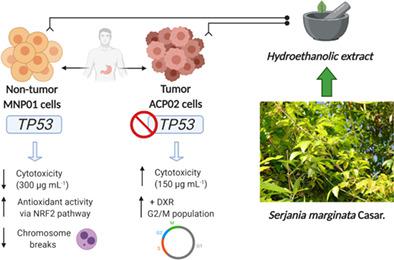当前位置:
X-MOL 学术
›
Environ. Toxicol.
›
论文详情
Our official English website, www.x-mol.net, welcomes your
feedback! (Note: you will need to create a separate account there.)
Selective anticancer effects of Serjania marginata Casar. extract in gastric cells are mediated by antioxidant response
Environmental Toxicology ( IF 4.4 ) Pub Date : 2021-04-22 , DOI: 10.1002/tox.23151 Juliana Mara Serpeloni 1 , Ana Flavia Leal Specian 1 , Diego Luis Ribeiro 1 , Katiuska Tuttis 1 , Silvia Cristina Heredia-Vieira 2 , Wagner Vilegas 3 , Wilner Martínez-López 4 , Eliana Aparecida Varanda 5 , Ilce Mara de Syllos Cólus 1
Environmental Toxicology ( IF 4.4 ) Pub Date : 2021-04-22 , DOI: 10.1002/tox.23151 Juliana Mara Serpeloni 1 , Ana Flavia Leal Specian 1 , Diego Luis Ribeiro 1 , Katiuska Tuttis 1 , Silvia Cristina Heredia-Vieira 2 , Wagner Vilegas 3 , Wilner Martínez-López 4 , Eliana Aparecida Varanda 5 , Ilce Mara de Syllos Cólus 1
Affiliation

|
Gastric cancer is the fifth most common malignancy worldwide. Serjania marginata Casar. (SM) displays anti-inflammatory properties and has been used to treat gastrointestinal disorders. In the current study, we examined whether the hydroethanolic extract of SM leaves exerted cytotoxic, mutagenic, and protective effects in non-tumor gastric epithelium cells (MNP01) and gastric adenocarcinoma cells (ACP02) in vitro and analyzed whether its action was selective. Initially, cell viability (MTT assay), cell cycle kinetics (flow cytometry), and cell proliferation (total protein content) were analyzed. In addition, genomic instability (cytokinesis-block micronucleus cytome assay), anti/pro-oxidant status (CM-H2DCFDA probe), and transcriptional expression (RT-qPCR) of genes related to cell cycle, cell death, and antioxidant defense were also evaluated. The SM extract was cytotoxic toward MNP01 and ACP02 cells at concentrations greater than 300 and 100 μg·ml−1, respectively, and decreased protein content only toward ACP02 cells at 200 μg ml−1. In ACP02 cells, the SM extract at 100 μg·ml−1 associated with doxorubicin (DXR; 0.2 μg ml−1) clearly promoted cell cycle arrest at the G2/M phase. The extract alone was not mutagenic to either cell type and reversed DXR-induced DNA damage and H2O2-induced oxidative stress in MNP01 cells. The gene expression experiments showed that SM hydroethanolic extract exerts an antioxidant response via NFE2L2 activation in non-tumor gastric cells, and cell cycle arrest (G2/M) in ACP02 gastric cancer cells via the TP53 pathway. The selective action of SM indicates that it is a promising therapeutic agent to treat gastric diseases and merits further studies.
中文翻译:

Serjania marginata Casar 的选择性抗癌作用。胃细胞中的提取物是由抗氧化反应介导的
胃癌是全球第五大常见恶性肿瘤。Serjania marginata Casar。(SM) 具有抗炎特性,已被用于治疗胃肠道疾病。在目前的研究中,我们检查了 SM 叶的水乙醇提取物是否在体外对非肿瘤胃上皮细胞 (MNP01) 和胃腺癌细胞 (ACP02) 发挥细胞毒性、诱变和保护作用,并分析其作用是否具有选择性。最初,分析了细胞活力(MTT 测定)、细胞周期动力学(流式细胞术)和细胞增殖(总蛋白质含量)。此外,基因组不稳定性(细胞分裂阻滞微核细胞组测定)、抗/促氧化状态(CM-H 2DCFDA 探针)和与细胞周期、细胞死亡和抗氧化防御相关的基因的转录表达 (RT-qPCR) 也进行了评估。所述SM提取物在浓度朝向MNP01和ACP02细胞的细胞毒性比300和100μg更大·毫升-1,分别与仅朝向在200微克毫升ACP02细胞减少蛋白质含量-1。在ACP02细胞,以100μg·毫升SM提取物-1与阿霉素相关联(DXR; 0.2微克毫升-1)清楚地在G2 / M期促进细胞周期停滞。单独的提取物对任一细胞类型都没有致突变性,并且在 MNP01 细胞中逆转了 DXR 诱导的 DNA 损伤和 H 2 O 2诱导的氧化应激。这基因表达实验表明,SM 水乙醇提取物通过非肿瘤胃细胞中的NFE2L2激活发挥抗氧化反应,并通过TP53途径在 ACP02 胃癌细胞中发挥细胞周期停滞 (G2/M) 的作用。SM 的选择性作用表明它是一种很有前景的治疗胃病的药物,值得进一步研究。
更新日期:2021-04-22
中文翻译:

Serjania marginata Casar 的选择性抗癌作用。胃细胞中的提取物是由抗氧化反应介导的
胃癌是全球第五大常见恶性肿瘤。Serjania marginata Casar。(SM) 具有抗炎特性,已被用于治疗胃肠道疾病。在目前的研究中,我们检查了 SM 叶的水乙醇提取物是否在体外对非肿瘤胃上皮细胞 (MNP01) 和胃腺癌细胞 (ACP02) 发挥细胞毒性、诱变和保护作用,并分析其作用是否具有选择性。最初,分析了细胞活力(MTT 测定)、细胞周期动力学(流式细胞术)和细胞增殖(总蛋白质含量)。此外,基因组不稳定性(细胞分裂阻滞微核细胞组测定)、抗/促氧化状态(CM-H 2DCFDA 探针)和与细胞周期、细胞死亡和抗氧化防御相关的基因的转录表达 (RT-qPCR) 也进行了评估。所述SM提取物在浓度朝向MNP01和ACP02细胞的细胞毒性比300和100μg更大·毫升-1,分别与仅朝向在200微克毫升ACP02细胞减少蛋白质含量-1。在ACP02细胞,以100μg·毫升SM提取物-1与阿霉素相关联(DXR; 0.2微克毫升-1)清楚地在G2 / M期促进细胞周期停滞。单独的提取物对任一细胞类型都没有致突变性,并且在 MNP01 细胞中逆转了 DXR 诱导的 DNA 损伤和 H 2 O 2诱导的氧化应激。这基因表达实验表明,SM 水乙醇提取物通过非肿瘤胃细胞中的NFE2L2激活发挥抗氧化反应,并通过TP53途径在 ACP02 胃癌细胞中发挥细胞周期停滞 (G2/M) 的作用。SM 的选择性作用表明它是一种很有前景的治疗胃病的药物,值得进一步研究。











































 京公网安备 11010802027423号
京公网安备 11010802027423号